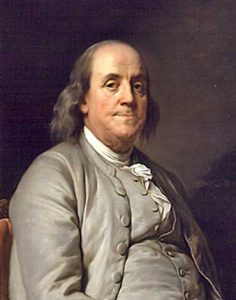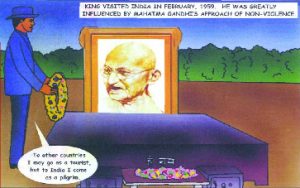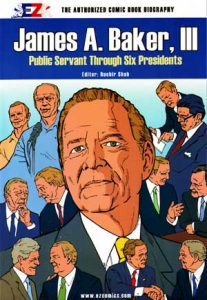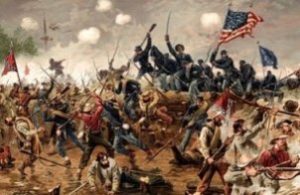SPAN Embassy Magazine, article about EZ Comics
Remember Garuda, the mythical, part- human bird who taught a stiff lesson to a thousand evil snakes? Or how Kumbhakarna, demon king Ravana’s gigantic, greedy sibling, was always shown surrounded by mounds of steaming, hot food.
Taking a cue from the memorable Indian characters and tales of the Amar Chitra Katha series, Indian American student Ruchir Shah has developed comics for 8 to14 year olds that show the lives of American heroes.
 “I have always been fascinated by history and learning about cultures from across the world,” says Shah, 17, who was named a U.S. Presidential Scholar in June at the White House. A first year student of Chinese, physics and history at Rice University in Houston, Texas, Shah was among 139 young people chosen for their excellence in academics and the arts. Instituted in 1964 by an executive order of President Lyndon B. Johnson, being named a Presidential Scholar is among America’s highest honors for high school students.
“I have always been fascinated by history and learning about cultures from across the world,” says Shah, 17, who was named a U.S. Presidential Scholar in June at the White House. A first year student of Chinese, physics and history at Rice University in Houston, Texas, Shah was among 139 young people chosen for their excellence in academics and the arts. Instituted in 1964 by an executive order of President Lyndon B. Johnson, being named a Presidential Scholar is among America’s highest honors for high school students.
“As a child, I read Amar Chitra Katha, the Indian brand of historical comic books, and two years ago, I did an internship at India Book House, the company that creates these books. I wanted an opportunity to bring that same model to the American students for whom history is often considered really boring,” says Shah.
The five week internship in the summer of 2006 gave him valuable experience in the art of comic book creation. “From the writing, drawing and formatting to printing and marketing, it allowed me to better understand the publishing process. This profound experience provided me with the foundation upon which to build and develop my business,” he says.
His mother, Vibha Shah, a computer programar, says her son’s chosen field of interest stems from his fascination with books since childhood. “We used to come home every week from the library with loads of books,” she says. “He liked reading so much that during his high school years, we had to hide the books away so he could concentrate on his studies.”
Shah’s brand, EZ Comics, publishes three titles—on Martin Luther King, Jr., Benjamin Franklin and the American Civil War. He says he has placed more than 750 copies at libraries, bookstores, schools and museums across the United States.
 Shah receives support from his parents, who moved to the United States from Mumbai in 1985 and 1990. In fact, a lot of help comes from his Mumbai based grandfather who coordinates with local artists and printers.
Shah receives support from his parents, who moved to the United States from Mumbai in 1985 and 1990. In fact, a lot of help comes from his Mumbai based grandfather who coordinates with local artists and printers.
But it’s Shah who decides the texts and layouts, communicating countless rounds of edits and design changes to the Indian illustrators via e-mail. “We help him both in terms of direction and important decisions. His grandfather has been very helpful too. He helped Ruchir get some of the artwork done using local artists to keep costs down. He has also given many ideas to build the Web site,” says his father, Fenil Shah, an electrical engineer in Rhode Island.
Creative’s aside, it was the marketing Shah found the toughest to negotiate. “Even though I had some negative responses during the marketing process, it was the experience of selling that I enjoyed the most, the thrill of learning that people were interested in buying what I had worked so hard to create,” says Shah, whose comics retail at $6.95 each.
While some educators feel comic books should not replace literature, they can be an entry point for reluctant readers and motivate them to read more, and better.
In 2007, the Maryland State Department of Education created the Maryland Comic Book Initiative called Comics in the Classroom, where credible, graphic novels and comics were introduced in regular classroom instruction for third and fourth graders.
“Reading is such an important activity for all children, and using comic book related lessons offers teachers an important new tool to draw students into the world of words,” says Maryland State Superintendent of Schools Nancy S. Grasmick.
Ian Schweikert, a social studies teacher at Far Middle School in San Diego, California, has used Shah’s comics and says his students have found them interesting. “They have been helpful with my lesson planning. Our first job has been making storyboards and these books have been an excellent way to demonstrate how to create the storyboards while learning about Martin Luther King, Jr., Benjamin Franklin and the Civil War,” says Schweikert.
To ensure accuracy, Shah had his comics vetted by experts, including Clayborne Carson, the founding director of the Martin Luther King, Jr., Research and Education Institute at Stanford University in California.
“I have worked with Ruchir Shah as he developed his comic books on King and support his efforts to use this means to educate young people about King’s life and the movements he inspired,” says Carson, who led a study group from Stanford to meet with Gandhi scholars and peace activists in New Delhi, Chennai and Madurai, Tamil Nadu, in September.
Shah counts the Presidential Scholar award as his most prized achievement. “It’s a great honor. Not many people get it,” he says. Shah stayed in Washington, D.C. for a week as part of the award program and met President George W. Bush. He was also among a group of 12 scholars chosen to visit China for a two-week study trip afterwards.
 Although he has no plans to enter the Indian market, Shah is now working on a comic book on Mohandas K. Gandhi. He says he is setting out with the premise that American children would love to read his story as much as Indian kids do. “More often than not, kids don’t grasp the heritage hidden in history. There is always a lot to learn from great historical figures. If kids love the fictional superhero comics, they will also love the real superheroes of the past.”
Although he has no plans to enter the Indian market, Shah is now working on a comic book on Mohandas K. Gandhi. He says he is setting out with the premise that American children would love to read his story as much as Indian kids do. “More often than not, kids don’t grasp the heritage hidden in history. There is always a lot to learn from great historical figures. If kids love the fictional superhero comics, they will also love the real superheroes of the past.”
To see the original post of the article – click here
